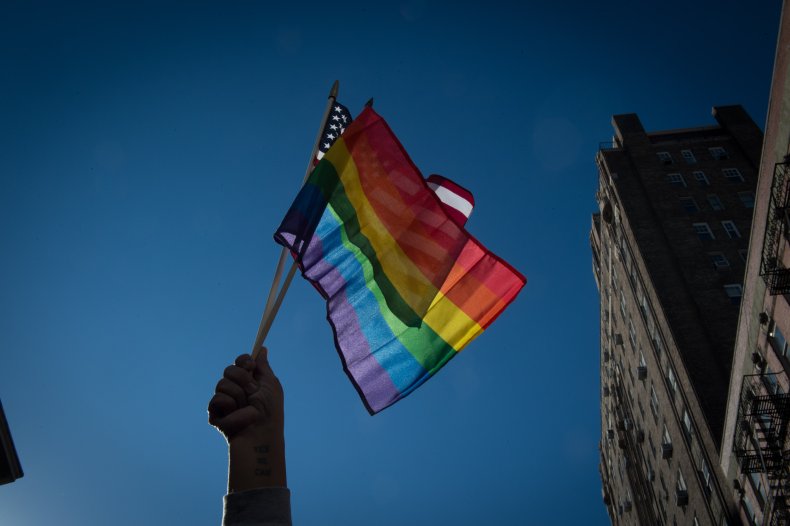In Health Care, Not Discriminating Is Not Enough | Opinion
The COVID-19 pandemic exposed social fissures in virtually every aspect of American life, revealing, for some, a gulf of inequity among different populations and their health outcomes all too well known to many. As one study found, social determinants account for a jaw-dropping 80 percent of health care disparities.
In America, we increasingly saw these disparities—especially during the pandemic—pronounced along racial and ethnic lines. Importantly, they also exist along sexual orientation and gender identity (SOGI) lines.
As health care professionals, we are compelled to reckon with our own role in perpetuating or eliminating health disparities. Put bluntly, not discriminating is not enough. There is no neutral ground when it comes to social justice in health. We need to be intentional and proactive in our efforts to dismantle those parts of the system that perpetuate health inequities and a culture of exclusion.
Like other marginalized populations, LGBTQ+ people share the chronic stress that comes from pervasive social stigma and discrimination—including fear of discrimination—which can impact our health.
Commercial determinants also play a role in the health of the LGBTQ+ community. LGBTQ+ people suffer from higher tobacco addiction rates as a result of being targeted directly by tobacco companies. And because bars have historically been a safe haven for the gay community, the alcohol use rate within the LGBTQ+ community is also higher. Too often ostracized by both gay and straight communities, bisexual women have the highest risk for alcohol overuse—a major risk factor for cancer, cardiovascular disease, stroke and depression.
Who we are should not affect our health so drastically, but it does. Personal health is governed, in part, by what each of us can control with our bodies and behaviors, but even more by how we are perceived and treated by others in the world and the built environment in which we live.
Moreover, humans are intersectional beings. Those who experience stigma based on more than one aspect of their identity—such as racism and heterosexism or racism and transphobia—have higher chronic stress that directly relates to health outcomes.
As researchers and clinicians with the unique power to make or break the future of health care for the 4.5 percent (and growing) population that identifies as LGBTQ+ and the approximately 1.7 percent of the population with intersex characteristics, we must—and can—do better now.

For starters, researchers need to collect more accurate data about SOGI in our daily work. Systematic data collection and disaggregated data reporting is critical for us to identify and address health challenges and disparities among LGBTQ+ persons. We also need to be more intentional about our research eligibility and ineligibility protocols. The Food and Drug Administration (FDA) should revisit why certain people are screened out of clinical trials. Does a woman who has never had sex with a man really need a pregnancy test to screen into a trial?
Likewise, researchers should collect SOGI data regardless of whether their research is specific to the LGBTQ+ community. The collection and reporting of SOGI data, along with subpopulations within Black, Latino, Asian and Native American communities, not only helps us address health equity issues but is also good stewardship of grant dollars.
But it is not enough to collect data. A recent study led by the American Society of Clinical Oncology showed that worry about patient mistrust was one reason providers were hesitant to even attempt to ask about SOGI. Health care providers must intentionally create inclusive clinical environments that show LGBTQ+ patients they are welcome and will receive ethical, quality care. We can ensure our nondiscrimination policies specifically protect LGBTQ+ patients, research participants and employees. This is especially important given past health care denial and discrimination leading to stealth for some LGBTQ+ people, many of whom may not trust health care providers.
Clinicians can ensure doctor's offices, waiting rooms and other clinical settings have visual displays of inclusion, and communicate with patients by using the words they use—including their chosen name, pronouns and names for body parts. Health care professionals can support patient's choices for caregivers and make sure questions are clinically-relevant and for the patient's well-being. Clinicians can ask patients about their values and preferences of care and consider hormone balance, organs and body composition when recommending clinical interventions. Health care providers should also be trained in trauma-informed care approaches for the LGBTQ+ community—understanding, for example, how certain health procedures, such as cervical screening for transgender men, can reinforce trauma is crucial in delivering good care.
While the Biden administration's recent executive order providing protections against discrimination in health care based on transgender status, and the American Medical Association's new strategic plan to embed racial and social justice into its work are positive and powerful steps toward dismantling health inequities, it's incumbent on each of us to educate ourselves on addressing the health and health care needs of sexual and gender minorities and persons who identify with any minoritized community.
Ultimately, as health care professionals, we should not just treat efforts to rectify health inequities as an opportunity, but as a moral obligation. It is past time to expand our understanding and improve our methods of care for LGBTQ+ people in order to do what we are called to do: recognize and affirm the inherent dignity in each and every human being we treat.
Mandi L. Pratt-Chapman is associate professor of medicine for the George Washington University School of Medicine and Health Sciences and associate center director for Patient-Centered Initiatives and Health Equity at the George Washington University Cancer Center.
The views expressed in this article are the writer's own.


